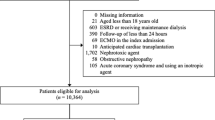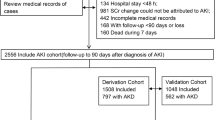Abstract
Background
Acute kidney injury (AKI) is common in patients with acute myocardial infarction. AKI in this setting is associated with short- and long-term adverse events. The aim of this study was to develop a simple score to predict AKI in patients presenting with acute myocardial infarction based on data available at time of admission.
Methods
This was a retrospective analysis of data collected as part of the Acute Coronary Treatment and Intervention Outcomes Network (ACTION) registry at a tertiary care center between 1/1/2011 and 12/31/2013. Data were collected prospectively for all patients who presented within 24 h of the onset of myocardial infarction. AKI was defined as an increase in creatinine from admission level to peak level of ≥0.3 mg/dl or by ≥50 %. Patients with history of end-stage renal disease requiring renal replacement therapy were excluded.
Results
Of 1107 patients included in the study, 147 (13.3 %) developed AKI. The following factors were independently associated with increased risk for AKI: cardiac arrest, decompensated heart failure on presentation, diabetes mellitus, hypertension, anemia, impaired renal function on presentation, and tachycardia on presentation. These factors were combined to form a new predictive tool. The new score showed excellent discrimination for AKI: the area under the receiver operating characteristic curve (AUROC) was 0.76 (95 % confidence interval 0.72–0.80).
Conclusion
A simple score using clinical and laboratory data available on admission can predict the risk of AKI in patients presenting with acute myocardial infarction.


Similar content being viewed by others
References
Marenzi G, Cosentino N, Bartorelli AL (2015) Acute kidney injury in patients with acute coronary syndromes. Heart 101(22):1778–1785. doi:10.1136/heartjnl-2015-307773
Fox CS, Muntner P, Chen AY, Alexander KP, Roe MT, Wiviott SD (2012) Short-term outcomes of acute myocardial infarction in patients with acute kidney injury: a report from the national cardiovascular data registry. Circulation 125(3):497–504. doi:10.1161/CIRCULATIONAHA.111.039909
Toso A, Servi SD, Leoncini M, Morici N, Murena E, Antonicelli R, Cavallini C, Petronio AS, Steffenino G, Piscione F, Bellandi F, Savonitto S (2015) Acute kidney injury in elderly patients with non-ST elevation acute coronary syndrome: insights from the Italian elderly: ACS study. Angiology 66(9):826–830. doi:10.1177/0003319714567738
Parikh CR, Coca SG, Wang Y, Masoudi FA, Krumholz HM (2008) Long-term prognosis of acute kidney injury after acute myocardial infarction. Arch Intern Med 168(9):987–995. doi:10.1001/archinte.168.9.987
Shacham Y, Steinvil A, Arbel Y (2016) Acute kidney injury among ST elevation myocardial infarction patients treated by primary percutaneous coronary intervention: a multifactorial entity. J Nephrol 29(2):169–174. doi:10.1007/s40620-015-0255-4
Shacham Y, Leshem-Rubinow E, Gal-Oz A, Arbel Y, Keren G, Roth A, Steinvil A (2015) Acute cardio-renal syndrome as a cause for renal deterioration among myocardial infarction patients treated with primary percutaneous intervention. Can J Cardiol 31(10):1240–1244. doi:10.1016/j.cjca.2015.03.031
Queiroz RE, de Oliveira LS, de Albuquerque CA, Santana Cde A, Brasil PM, Carneiro LL, Liborio AB (2012) Acute kidney injury risk in patients with ST-segment elevation myocardial infarction at presentation to the ED. Am J Emerg Med 30(9):1921–1927. doi:10.1016/j.ajem.2012.04.011
Marenzi G, Cabiati A, Bertoli SV, Assanelli E, Marana I, De Metrio M, Rubino M, Moltrasio M, Grazi M, Campodonico J, Milazzo V, Veglia F, Lauri G, Bartorelli AL (2013) Incidence and relevance of acute kidney injury in patients hospitalized with acute coronary syndromes. Am J Cardiol 111(6):816–822. doi:10.1016/j.amjcard.2012.11.046
Shacham Y, Gal-Oz A, Leshem-Rubinow E, Arbel Y, Flint N, Keren G, Roth A, Steinvil A (2015) Association of admission hemoglobin levels and acute kidney injury among myocardial infarction patients treated with primary percutaneous intervention. Can J Cardiol 31(1):50–55. doi:10.1016/j.cjca.2014.11.001
Shacham Y, Leshem-Rubinow E, Gal-Oz A, Arbel Y, Keren G, Roth A, Steinvil A (2014) Relation of time to coronary reperfusion and the development of acute kidney injury after ST-segment elevation myocardial infarction. Am J Cardiol 114(8):1131–1135. doi:10.1016/j.amjcard.2014.07.032
Levin A, Warnock DG, Mehta RL, Kellum JA, Shah SV, Molitoris BA, Ronco C, Acute Kidney Injury Network Working G (2007) Improving outcomes from acute kidney injury: report of an initiative. Am J Kidney Dis Off J Natl Kidney Found 50(1):1–4. doi:10.1053/j.ajkd.2007.05.008
Levey AS, Coresh J, Greene T, Stevens LA, Zhang YL, Hendriksen S, Kusek JW, Van Lente F, Chronic Kidney Disease Epidemiology C (2006) Using standardized serum creatinine values in the modification of diet in renal disease study equation for estimating glomerular filtration rate. Ann Intern Med 145(4):247–254
Sadeghi HM, Stone GW, Grines CL, Mehran R, Dixon SR, Lansky AJ, Fahy M, Cox DA, Garcia E, Tcheng JE, Griffin JJ, Stuckey TD, Turco M, Carroll JD (2003) Impact of renal insufficiency in patients undergoing primary angioplasty for acute myocardial infarction. Circulation 108(22):2769–2775. doi:10.1161/01.CIR.0000103623.63687.21
Sgura FA, Bertelli L, Monopoli D, Leuzzi C, Guerri E, Sparta I, Politi L, Aprile A, Amato A, Rossi R, Biondi-Zoccai G, Sangiorgi GM, Modena MG (2010) Mehran contrast-induced nephropathy risk score predicts short- and long-term clinical outcomes in patients with ST-elevation-myocardial infarction. Circ Cardiovasc Interv 3(5):491–498. doi:10.1161/CIRCINTERVENTIONS.110.955310
Mehran R, Aymong ED, Nikolsky E, Lasic Z, Iakovou I, Fahy M, Mintz GS, Lansky AJ, Moses JW, Stone GW, Leon MB, Dangas G (2004) A simple risk score for prediction of contrast-induced nephropathy after percutaneous coronary intervention: development and initial validation. J Am Coll Cardiol 44(7):1393–1399. doi:10.1016/j.jacc.2004.06.068
Marenzi G, Lauri G, Assanelli E, Campodonico J, De Metrio M, Marana I, Grazi M, Veglia F, Bartorelli AL (2004) Contrast-induced nephropathy in patients undergoing primary angioplasty for acute myocardial infarction. J Am Coll Cardiol 44(9):1780–1785. doi:10.1016/j.jacc.2004.07.043
Weisbord SD, Palevsky PM (2008) Prevention of contrast-induced nephropathy with volume expansion. Clin J Am Soc Nephrol CJASN 3(1):273–280. doi:10.2215/CJN.02580607
Fishbane S (2008) N-acetylcysteine in the prevention of contrast-induced nephropathy. Clin J Am Soc Nephrol CJASN 3(1):281–287. doi:10.2215/CJN.02590607
Marenzi G, Assanelli E, Campodonico J, Lauri G, Marana I, De Metrio M, Moltrasio M, Grazi M, Rubino M, Veglia F, Fabbiocchi F, Bartorelli AL (2009) Contrast volume during primary percutaneous coronary intervention and subsequent contrast-induced nephropathy and mortality. Ann Intern Med 150(3):170–177
Acknowledgments
The authors would like to acknowledge Mrs. Elizabeth Purinton and the cardiovascular institute at Florida Hospital in Orlando, FL for their help with the study.
Author information
Authors and Affiliations
Corresponding author
Ethics declarations
Informed consent
Informed consent was obtained from all individual participants included in the study before enrollment in the Acute Coronary Treatment and Intervention Outcomes Network (ACTION) registry.
Ethical approval
All procedures performed in studies involving human participants were in accordance with the ethical standards of the institutional and national research committee and with the 1964 Helsinki declaration and its later amendments or comparable ethical standards. For this type of retrospective study formal consent is not required. The study was approved by the local institutional office of research administration and institutional review board (IRB).
Conflict of interest
The authors declare that they have no conflict of interest.
Funding
No funding was received for this study.
Rights and permissions
About this article
Cite this article
Abusaada, K., Yuan, C., Sabzwari, R. et al. Development of a novel score to predict the risk of acute kidney injury in patient with acute myocardial infarction. J Nephrol 30, 419–425 (2017). https://doi.org/10.1007/s40620-016-0326-1
Received:
Accepted:
Published:
Issue Date:
DOI: https://doi.org/10.1007/s40620-016-0326-1




